
Meterana is a genus of moths of the family Noctuidae. This genus is endemic to New Zealand.
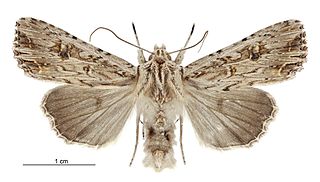
Ichneutica lignana is a moth of the family Noctuidae. It is endemic to New Zealand. This species is found on the Three Kings Islands as well as the North, South and Stewart Islands. This species lives in a variety of habitats including coastal areas, tussock grasslands, shrublands, and native forest, at a range of altitudes from sea level to over 1300 m. I. lignana is quite distinctive in appearance with its dark markings on the abdomen and forewings although it is possible to confuse Ichneutica morosa, Meterana pansicolor and Meterana pascoi with this species. Adults are on the wing throughout the year in the northern parts of the New Zealand but are restricted to the months of October to April in the more southern parts of the country.
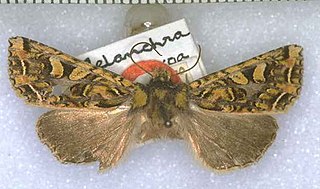
Meterana tetrachroa is a species of moth of the family Noctuidae. This species is endemic to New Zealand. It is classified as "Data Deficient" by the Department of Conservation.

Meterana pictula is a moth of the family Noctuidae. It is endemic to New Zealand. This species has been classified as "At Risk, Declining" by the Department of Conservation.

Meterana pascoei is a moth in the family Noctuidae, endemic to New Zealand. The name and description were published as Morrisonia pascoei by William George Howes in 1912. It is about 38 mm long, with reddish-brown forewings marked with faint lines and a pair of kidney-shaped marks, and a reddish-brown abdomen with a pronounced tuft at the end. Howes named the species in honour of Merlin O. Pasco of Queenstown, who had sent him 20 specimens caught at a treacle-baited moth trap – Howes had previously collected just two specimens, in 1910. In 1928, in his book The Butterflies and moths of New Zealand, George Vernon Hudson discussed this species, placing it within the genus Melanchra and editing the epithet to "pascoi". John S. Dugdale also used the epithet "pascoi" and proposed several new synonyms for this species in his 1988 publication Lepidoptera - annotated catalogue, and keys to family group taxa.
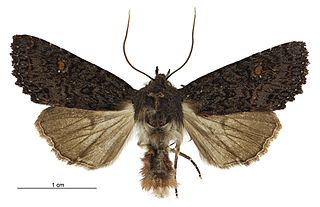
Meterana vitiosa is a moth of the family Noctuidae. It was described by Arthur Gardiner Butler in 1877 from specimens collected by Dr Hector and Mr J. D. Enys in the South Island. It is endemic to New Zealand. The habitat this species prefers consists of forests and shrub-land areas. Adults are on the wing throughout the year.

Meterana pansicolor is a species of moth in the family Noctuidae. It is endemic to New Zealand. This species is classified as "At Risk, Naturally Uncommon" by the Department of Conservation.

Meterana ochthistis is a species of moth in the family Noctuidae. It was described by Edward Meyrick in 1887 from specimens obtained in Christchurch. It is endemic to New Zealand.

Meterana exquisita is a species of moth in the family Noctuidae. This species is endemic to New Zealand. It is classified as "At Risk, Relict'" by the Department of Conservation.
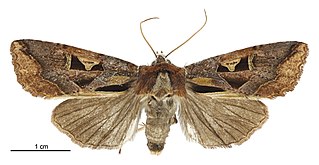
Meterana grandiosa is a species of moth in the family Noctuidae. This species is endemic to New Zealand. It is classified as "At Risk, Relict'" by the Department of Conservation.

Meterana alcyone is a species of moth in the family Noctuidae. This species is endemic to New Zealand and is found in the North and South Islands. The larvae of this species feed on the leaves of Muehlenbeckia complexa and Corynocarpus laevigatus. Adults are on the wing every month of the year except January. They are attracted to light and have also been recorded as bycatch in the New Zealand National Fruit Fly Surveillance fly traps.

Meterana asterope is a species of moth in the family Noctuidae. This species is endemic to New Zealand and is found in the North and South Islands. It inhabits both native forest and open habitat and adults emerge during the New Zealand summer. Adults are on the wing in December and January. This species is attracted to light and has also been collected via sugar traps.

Meterana badia is a species of moth in the family Noctuidae. This species is endemic to New Zealand.

Meterana coctilis is a species of moth in the family Noctuidae. This species is endemic to New Zealand.
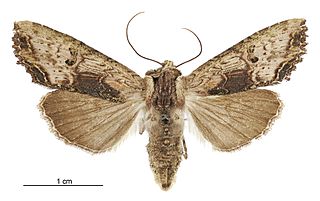
Meterana coeleno is a species of moth in the family Noctuidae. This species is endemic to New Zealand.

Meterana decorata is a species of moth in the family Noctuidae. This species is endemic to New Zealand.

Meterana diatmeta is a species of moth in the family Noctuidae. This species is endemic to New Zealand.

Meterana dotata is a species of moth in the family Noctuidae. This species is endemic to New Zealand.
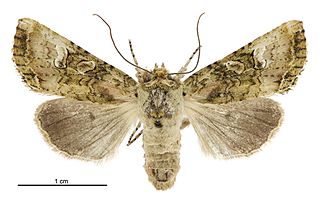
Meterana levis is a species of moth in the family Noctuidae. This species is endemic to New Zealand.

Meterana merope, also known as the Patē Owlet, is a species of moth in the family Noctuidae. This species is endemic to New Zealand. The larvae of this species feed on pāte.




















